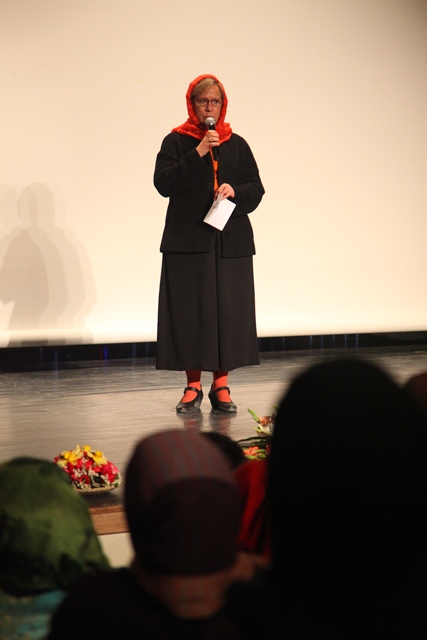KABUL - The contributions to society of a range of Afghan women pioneers and leaders were celebrated this past week, in a United Nations-backed event linked to the observance of International Women’s Day.
Organized by the UN Assistance Mission in Afghanistan (UNAMA), and in partnership with its frequent media collaborator, Channel 1, the three-hour event, held on Thursday in the capital, Kabul, included the presentation of special awards, a display of artwork and musical performances.
Ten women – pioneers in their respective fields – were given special awards, while more than 40 others – hailing from government institutions, civil society organizations and different areas of sports – were recognized with certificates for their achievements in their fields.
The pioneers included an athlete, Tehmina Kohistani, who represented Afghanistan at the 2012 Olympic Games; Nasreen Jan, a police officer, in recognition of her deep-seated dedication to her work; Manezha Hewad, an artist from the Afghanistan Centre for Arts also known for her activism; and Saddaf Jan Ameeri, a student at the Kabul Polytechnic University’s Engineering Department, who came first in the university’s 1389 (2010-2011) entrance examination.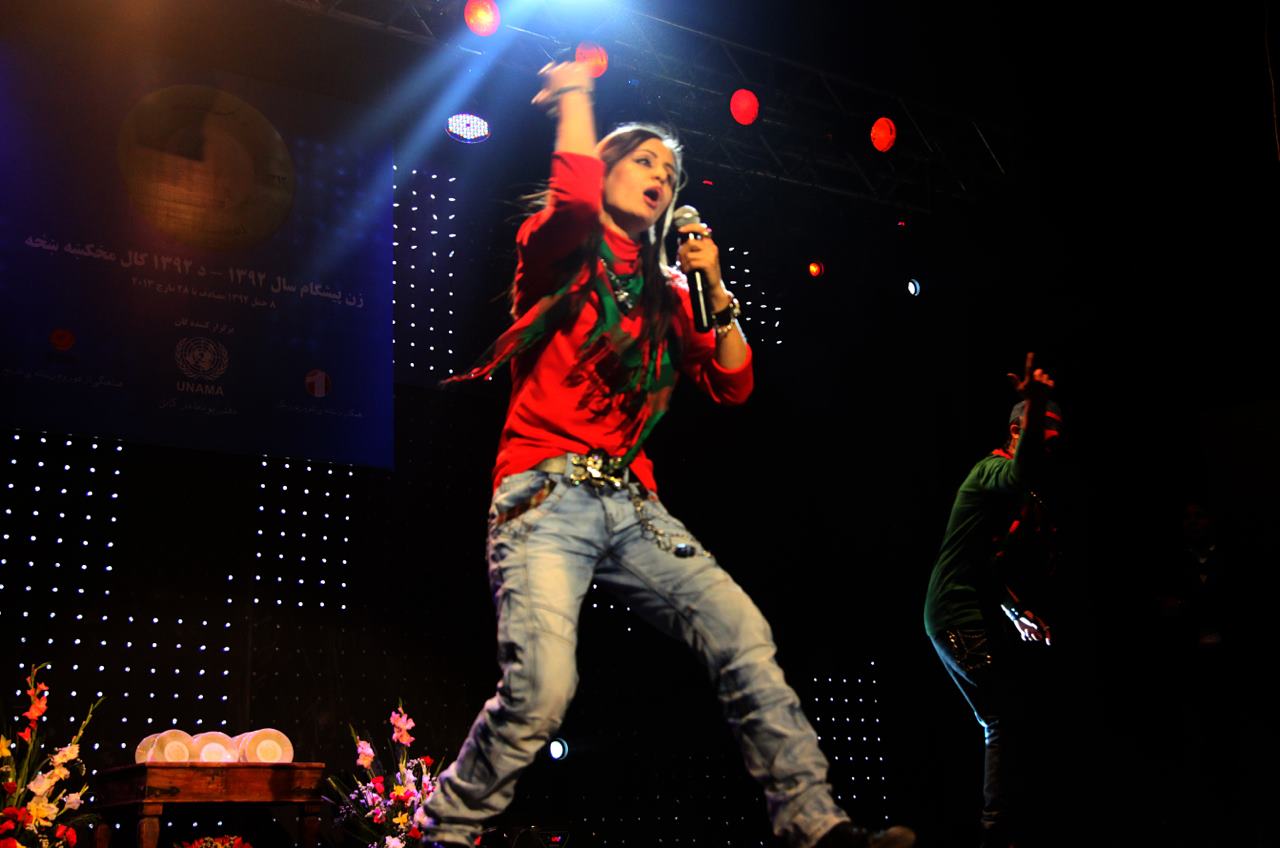
Observed around the world on 8 March annually, the UN-backed International Women’s Day recognizes women for their achievements without regard to divisions, whether national, ethnic, linguistic, cultural, economic or political. This year’s theme was ‘A promise is a promise: Time for action to end violence against women,’ and sought to strengthen the international community’s commitment to putting an end to violence against women.
Addressing the Kabul event, the Director of UNAMA’s Strategic Communications and Spokesperson’s Unit (SCSU), Massoumeh Torfeh, said that the empowerment of women and the elimination of violence against them is a top priority for the world body, and, in particular, for UNAMA.
She noted that the UN political mission’s reports on the elimination of violence against women and civilian casualties caused by the conflict have had a strong impact in helping changing perceptions towards women. In regard to the latter, UNAMA’s most recent report on the protection of civilians, issued in February, found that while the number of civilian casualties in the armed conflict had dropped for the first time in several years, there had also been a 20 per cent increase in the number of Afghan women and girls killed and injured in the conflict.
“UNAMA’s mandate stresses the participation of women in the country’s political process, particularly the ongoing peace and reconciliation process and the upcoming presidential elections,” Ms. Torfeh added.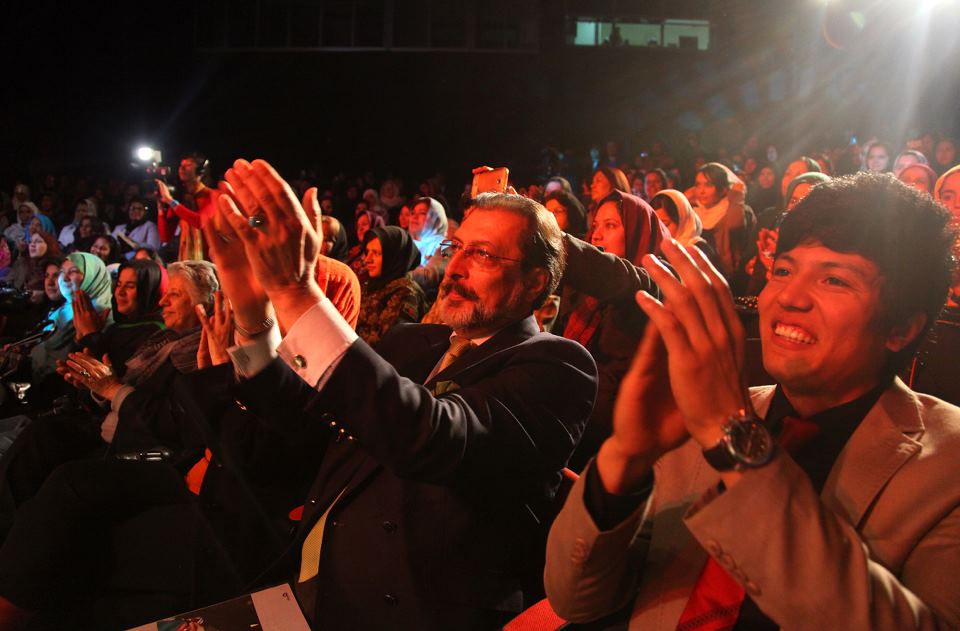
The issue of women in Afghanistan featured strongly in the resolution renewing the mandate of UNAMA, which the UN Security Council recently adopted, extending the mission for another year, until 23 March 2014.
The resolution notes the progress made regarding women’s participation in Afghan governmental bodies and institutions and encourages their further participation in decision-making processes. In it, the Council, also reiterated the need for their “full, equal and effective” participation at all stages of the country’s peace processes and urged “their involvement in the development and implementation of post-conflict strategies” in order to take into account their perspectives and needs.
Afghanistan is due to hold a presidential election on 5 April next year, marking an end to the second term of the incumbent, President Hamid Karzai. The political transition coincides with a security transition currently underway, which is seeing the Afghan authorities take over responsibilities previously assumed by international allies. UNAMA is engaged in supporting the country’s peace and reconciliation efforts, working closely with Afghanistan’s High Peace Council in this respect and consulting widely with political stakeholders.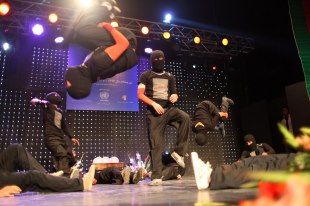
In her comments, Ms. Torfeh called on Afghan women to participate in the political life of the country and choose candidates who had better policies on women.
She noted that as they made up 50 per cent of the population, women had power through their votes to encourage better policies on women, adding that “this is a crucial year in determining the future of Afghanistan and you have to play your significant role in both the elections and in the peace process.”
In her remarks to the event, a parliamentarian from the Wolesi Jirga [Afghanistan’s Lower House of Parliament], Shinkai Karokhail, said that Afghan women have achieved much, but their role in society was not being given its due importance.
“If the Afghan Government pays the required attention towards Afghan women and provides proper opportunities for their growth in all walks of life, particularly politics, the people of Afghanistan will have a completely different experience of life and the fate of country will change for the better,” Mrs. Karokhail said.
She added that one of the reasons for Afghanistan’s lack of development in areas affecting women is that its women have not been given sufficient opportunities to progress.
The presentation of awards and speeches were followed by the exhibition of artwork by women artists, with a common theme of portraying the issues and challenges faced by Afghan women. The art exhibition was followed by a musical performance by prominent Afghan women singers.
This stage of the event was preceded by the screening of a song produced for International Women’s Day by the UN Entity for Gender Equality and the Empowerment of Women (UN Women), and launched earlier in March.
Entitled ‘One Woman: A Song for UN Women,’ the song is a musical celebration of women worldwide, featuring 25 artists from 20 countries across the globe. Its lyrics were inspired by stories of women whom UN Women has supported.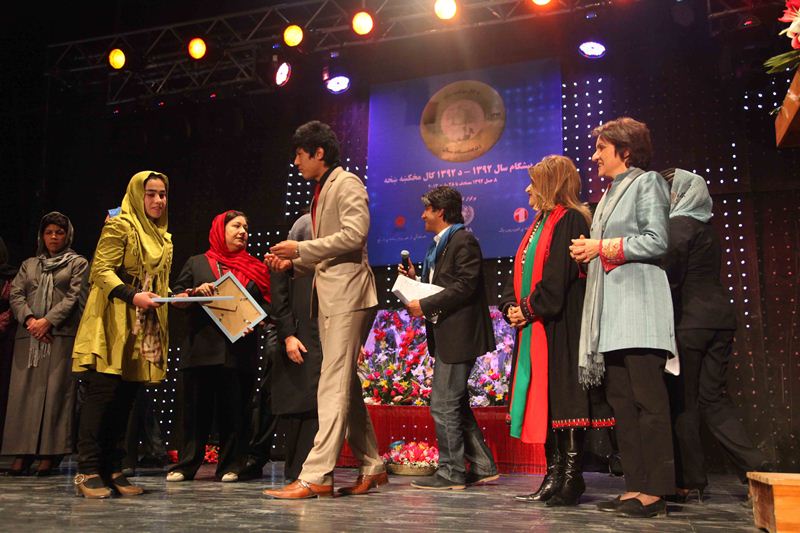
“‘One Woman’ calls for change and celebrates courage and determination by ordinary women in the daily life and the women who make extraordinary contributions to their countries and communities,” the representative for UN Women in Afghanistan, Ingibjorg Gisladottir, said in introducing the song.
“UN Women dedicates the song today to the Afghan men and women striving for a better life for Afghan women,” she added.
Following the screening of the UN Women song, a collection of music video clips were shown, each highlighting issues of women’s rights. These were followed by live performances from a selection of Afghan artists, including two special guests for the occasion, the well-known Afghan singers, Wajeha Rastgar and Shehla Zaland; Bahar; Hadiya Rastgar; Farzana Nawabi; female rap singer Sosan Feroz; rap singers Mateen and Farhad from the group 'FM;' and the FACE Off acrobatic group.
- Click here for Facebook photo story "Contribution of women to Afghan society celebrated".
- Click here for more photos of the UNAMA event in Kabul.



